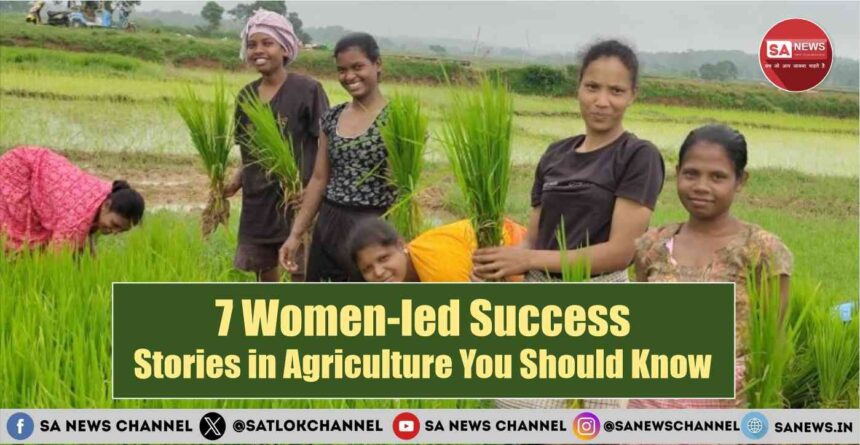Agriculture has long been considered as a male- dominated field especially in rural areas. But nowadays, women are also showing their interest in agricultural careers. Not only for obtaining degrees but also by actively contributing to agriculture with innovation, resilience and sustainability.
- Saalumarada Thimmakka – The Mother of Trees
- Contribution: Organic farming and farmer training
- Padma Shri Subhasini Mistry – From daily wage worker to hospital founder
- Krishna Yadav – From Pickles to Prosperity
- Kalpana Saroj – The Original slumdog Millionaire of Agribusiness
- Why Women in Agriculture Matter?
- Challenges Women Still Face
- 1. Clarity of Purpose through Satgyan
- 2. Freedom from addictions and wasteful practices:
- 3. Development of Moral and social leadership:
- 4. Boost up the faith in God and mental strength :
- Conclusion
- Frequently Asked Questions ( FAQs)
- 1. Are there any government schemes supporting women in agriculture?
- 2. Why is it important to highlight women- led success stories in agriculture?
- 3. How can I support women in agriculture?
- 4. How have these women succeeded despite the challenges?
- 5. What challenges do women farmers commonly face in India?
Following are 7 Women-led Success Stories in Agriculture, these stories are proof that when women get equal knowledge, opportunities, and resources, they become powerful changemakers in sectors like agriculture.
Here we are presenting examples of 7 pioneering women stories who have made their significant impact in agriculture. These women are from diverse regions with their various backgrounds and face different challenges, yet they all have a common vision to make the field of agriculture more prosperous, efficient and inclusive.
Saalumarada Thimmakka – The Mother of Trees
- Location: Karnataka, India
- Contribution: Agroforestry and Environmental Conservation
Saalumarada Thimmakka, often referred to as the “Mother of Trees,” is a remarkable environmentalist who began planting banyan trees in Karnataka along the highway in Hulikal village, alongside her late husband. Despite having no formal education and coming from a poor background, she has planted and nurtured over 8,000 trees, including 385 banyan trees across a 45- km stretch.
Her contribution has promoted agroforestry practices and inspired thousands to take up plantation as a part of sustainable agriculture. For her efforts, she has received numerous honours, including the “Padma Shri Award – 2019”. This story of Thimmakka is a powerful reminder of how even the simplest act of dedication can leave a long lasting impact on ecology and agriculture.
- Revathi K – Champion of Organic farming
- Location: Tamilnadu, India
Contribution: Organic farming and farmer training
Revathi K was a computer science engineer who left her high- paying job in IT sector to return to her roots and embrace farming in Tamilnadu. Disillusioned by the urban hustle, she turned a barren piece of land into a thriving organic farm.
She grows more than 120 varieties of fruits and vegetables by practicing zero- budget natural farming and sells her produce directly to customers under her brand “Revathi Farms”. She also gives training to farmers, especially women, in sustainable agricultural practices and helps them transition to organic methods.
Revathi’s decision to adopt environmentally conscious farming not only made her a successful agripreneur but also a mentor for many aspiring women farmers.
Padma Shri Subhasini Mistry – From daily wage worker to hospital founder
Location: West Bengal, India
Contribution: Community farming and health care through Agricultural earnings
Though not a conventional farmer, the journey of Subhasini Mistry is deeply rooted in agriculture. After losing her husband at a young age due to lack of medical care, she worked as a housemaid and vegetable seller. With her meager earnings, she invested a small plot of land and began vegetables and seasonal crops cultivation.
Through her immense efforts and hard work, she saved money and built a hospital named ” Humanity Hospital” in Hanspukur village, where free treatment is given to poor patients. She did hard work and financed it entirely through her agricultural income and community support.
This story highlights how farming can become a tool of social transformation, especially in the hands of determined women.
Sangita Reddy – Empowering women farmers in Maharashtra
Location: Maharashtra, India
Contribution: Women farmers collective and supply chain innovation
Sangita Reddy is a co-founder of Sakhi Mandal, a Women-led Self-help group ( SHG) based in Vidarbha, Maharashtra. Coming from a small landholder’s family, Sangita realised the struggle rural women faced in accessing markets, resources and fair prices for their produce.
She organized over 300 women farmers and grew pulses and grains organically. Now, the group of 300 women supplies their pulses and grains directly to urban retail stores and earn better profits by cutting out middlemen.
Sangita’s community leadership not only increased income but also she has given rural women financial independence and confidence. Today, other villages have also been inspired by her and she regularly speaks at agricultural conferences.
Krishna Yadav – From Pickles to Prosperity
Location: Delhi, India
Contribution: Value Addition in agriculture
Krishna Yadav’s journey is an exemplary tale of how value addition in agriculture can change lives. After moving to Delhi with her husband and facing severe financial hardship, Krishna began making pickles using locally available produce.
Also Read: From Traditional Farming to Smart Agriculture: A Tech-Driven Transformation
What began as a small home-based business has grown into “Mrs. Krishna Pickles”, a company that employs over 150 women and processes tons of farm produce into pickles, chutneys, and other products. She sources her raw materials directly from farmers, promoting local agriculture.
Her success has been recognised nationally and she conducts workshops for rural women on food processing and entrepreneurship, promoting Agribusiness as a viable path for rural development.
Kalpana Saroj – The Original slumdog Millionaire of Agribusiness
Location: Maharashtra, India
Contribution: Agro-industrial revival and job creation
Born into a Dalit family and married off at the age of 12, Kalpana Saroj faced extreme adversity including abuse and poverty. After escaping her abusive marriage, working in a garment factory, she took a government loan to start a tailoring business. Finally by expanding into real estate, she turned around a bankrupt company – Kamani Tubes Ltd.
One of the lesser-known aspects of her work is her investment in agro- based industries, particularly sugarcane farming and processing, which has provided livelihood to thousands of rural workers. She has created employment in agricultural zones and empowered underprivileged communities through her inclusive business model.
Her rise from the slums to the boardroom was recognized with the Padma Shri in 2013. Kalpana continues to support agricultural innovation and rural entrepreneurship.
Sujata and Anuja Pawar – Sisters Reviving Millets in Maharashtra
Location: Maharashtra, India
Contribution: Millet Farming and Marketing
Sujata and Anuja Pawar, sisters from Pune, left their corporate careers to pursue farming. Inspired by their grandmother’s food wisdom, they began growing nutritious millets like ragi, jowar, bajra on their ancestral land using traditional methods.
They formed their startup, Tritvam Naturals, to produce, package and market millets and value-added products like cookies, flour mixes, and ladoos. By reviving forgotten grains and promoting them among urban consumers, the sisters have created a profitable niche market.
They also conduct awareness programs about the health benefits of millets, which has indirectly helped local farmers to find better markets for their produce.
Why Women in Agriculture Matter?
These seven stories are more than tales of personal achievement – they are blueprints for inclusive rural development. When women are involved in agriculture:
- Productivity increases due to more diverse skill sets.
- Nutrition improves, as women prioritize household food security.
- Income diversifies through value addition and cottage industries.
- Sustainability improves as women often adopt eco-friendly practices.
According to the Food and Agriculture Organization (FAO), if women had the same access to resources as men, agricultural output in developing countries could rise by up to 30%.
Challenges Women Still Face
Despite these successes, millions of women farmers still face systemic challenges:
1. Land ownership: Only about 13% of landholders in India are women.
2. Access to credit: Banks often deny loans due to lack of collateral or male co-signers.
3. Training and inputs: Women have less access to agricultural training programs and modern tools.
4. Recognition: Many women farmers are not officially recognised and remain invisible in statistics.
Role of Satgyan by Sant Rampal ji Maharaj in Women’s Success in Agriculture
Today women are stepping into fields once considered beyond their reach, including agriculture. Yet, true sustainable success, mental peace with material progress is rare. This is where Satgyan ( True Spiritual Knowledge), as given by Bandi Chhod Sant Rampal ji Maharaj, plays a revolutionary role in transforming women’s lives, including their journey in agriculture.
1. Clarity of Purpose through Satgyan
Sant Rampal ji Maharaj imparts spiritual knowledge from all our holy scriptures (Vedas, Gita, Bible, Quran, Guru Granth Sahib) which clarifies the real purpose of human life: to attain liberation ( moksh) by worshipping the Supreme God Kabir Saheb ji.
This purposeful life empowers women in agriculture not just to earn a living, but to live with higher consciousness, turning every action into a step towards salvation.
2. Freedom from addictions and wasteful practices:
With Naam Diksha ( Initiation), women leave behind:
– Intoxicants ( alcohol, tobacco, etc.)
– Time wasting entertainment ( television, superstitions, and idle distractions)
– Unproductive rituals ( Shraddh, Pitru Puja, demigod worship)
This gives clear mind and extra time which they invest in learning modern agri-tech, organic farming, marketing produce, training other women. This internal discipline is the root of external success.
3. Development of Moral and social leadership:
Satgyan cultivates fearlessness, honesty, and kindness in women. Such qualities make them natural leaders in SHGs( self help groups), cooperatives, and local farming bodies.
4. Boost up the faith in God and mental strength :
Agriculture is uncertain, crop failure, weather risks, market price drop, but women who chant satnam/ saarnam daily, trusts supreme God Kabir ji as the true doer, accepts both profit and loss as His will, and stays peaceful and resilient even in adversity.
This Spiritual backbone gives them mental strength which is missing in many modern women.
5. Blessings that multiply their efforts:
It is often seen that after taking Naam, the efforts of women in farming begin to yield unexpected results:
– more yield with less input
– timely rains or proper climate
– help from unexpected sources
– protection from loss or damage
Because Supreme God Kabir helps his devotees. This is the unseen divine role behind their visible success.
Conclusion
These Women-led Success Stories reflect a powerful shift in India’s agricultural landscape, from sowing seeds to building empires. They prove that when women are given the opportunity, they can lead agrarian revolutions. Women are not only able to feed the nation but also can transform it.
In this way, for a truly sustainable and equitable agriculture future, empowering women is not optional but, it’s essential. So, the road ahead must focus on policy reforms, gender-sensitive training, and financial inclusion to enable more women to follow in their footsteps.
Frequently Asked Questions ( FAQs)
1. Are there any government schemes supporting women in agriculture?
Yes, there are several schemes of Government of India that supports women farmers, these are as follows:
– Mahila Kisan Sashaktikaran Pariyojana ( MKSP)
– PM- KISAN
– National Rural Livelihood Mission ( NRLM )
– NABARD support programs
These aim to empower women through skill development, financial inclusion and collective farming models.
2. Why is it important to highlight women- led success stories in agriculture?
Highlighting these stories brings attention to the significant but often overlooked contributions of women in farming. It inspires others, promotes gender equality, and encourages policy support for women in agriculture.
3. How can I support women in agriculture?
You can:
– Buy directly from Women-led farm businesses or cooperatives
– Promote their stories on social media
– Volunteer with organizations that train women farmers
– Advocate for gender- equity policies in farming
4. How have these women succeeded despite the challenges?
These women overcame barriers through determination, innovation, community support, self- help groups, government schemes and often spiritual or moral inspiration that strengthened their resilience and focus.
5. What challenges do women farmers commonly face in India?
Women in agriculture face several challenges including:
– Limited access to land ownership
– Poor access to credit and insurance
– Lack of education and technical training
– Gender discrimination
– Limited representation in decision – making bodies









